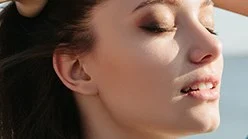Sunscreen isn’t just for summer, learn why you need to be wearing it all year!

Sunscreen should be used year-round and is important to apply in all skin types.
The American Academy of Dermatology (AAD) recommends sunscreen that is broad-spectrum (protects against UVA and UVB rays), has an SPF 30 or higher, and has water resistance. No sunscreen is “waterproof” or “sweatproof” and these terms can be misleading. All sunscreens should be reapplied every two hours and/or after swimming/sweating. Most adults need about 1 ounce, enough to fill a shot glass, to cover all sun exposed skin. Sunscreen should be applied about 15 minutes before going outdoors.
SPF of at least 30 or higher is recommended in sunscreen since it blocks about 97% of UVB rays. UVB rays are absorbed into the top layer of skin and increase one’s risk of a sunburn. UVB rays also damage skin cells and cause DNA mutations that eventually lead to melanoma and other types of skin cancer. UVA rays can penetrate beyond the top layer of skin and contribute to signs of aging by damaging collagen and elastin. While they penetrate at different levels of the skin, UVA and UVB rays can partner up to cause skin cancer.
Two main types of sunscreens exist, mineral-based and chemical sunscreens. Mineral-based sunscreens are also referred to as physical sunscreens since they work like a shield, sitting on the skin’s surface to deflect UV rays. Favorable for sensitive skin, mineral sunscreens contain active ingredients titanium dioxide and/or zinc oxide. Chemical sunscreens, on the other hand, act like a sponge on the skin by absorbing sun rays.
Other ways to protect the skin from harmful UV rays include sitting in the shade, wearing wide-brimmed hats and covering up with UPF clothing. Try to avoid the sun when the UV rays are strongest, between the hours of 10AM and 2PM. Extra caution should be taken near water, snow and sand as these surfaces reflect damaging sun rays and increase the risk of a sunburn.
Sunscreens can be purchased in both the Fort Washington and Lansdale office locations. A fan favorite for daily use on the face, neck and chest is Elta MD UV Clear SPF46 lotion. This sunscreen contains zinc oxide and is safe to use in acne/rosacea-prone skin or sensitive skin in general. Schedule a visit with Megan Quinn, PA-C, to screen for skin cancer and further discuss how protect the skin from harmful UV rays.
